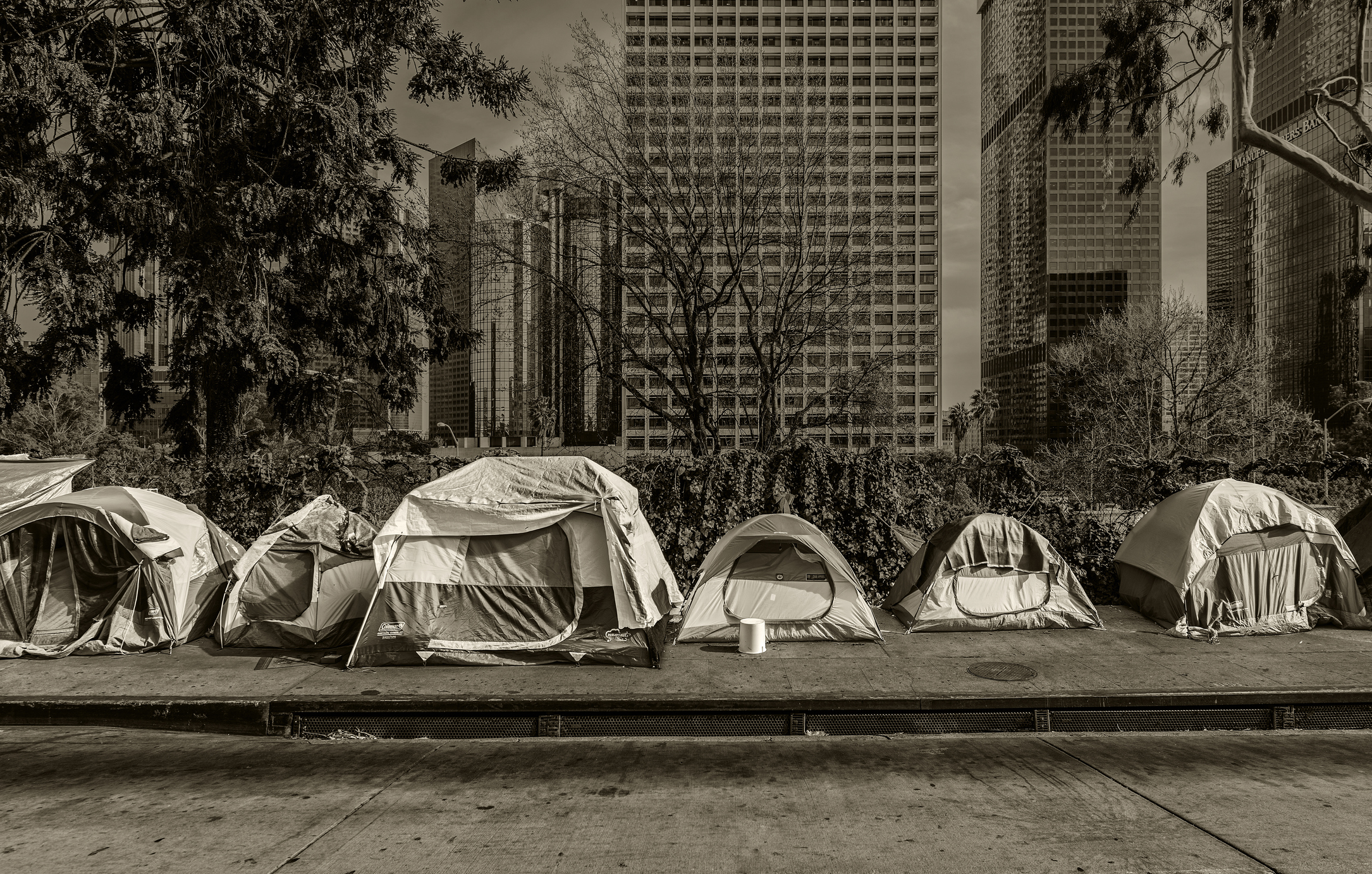Latest News
There’s a Real, Live Plan to End Poverty in California
Michael Tubbs, who launched Stockton’s famous universal basic income experiment, discusses his EPIC project with Manuel Pastor, director of USC’s Equity Research Institute.

Michael D. Tubbs wants to crush poverty in California. And he has a plan.
Tubbs, the former mayor of Stockton, launched nonprofit End Poverty In California (EPIC) in February with a 51-page outline published by Stanford University. It calls for overhauling California’s vast, complex social programs and upending policies and systems that have dictated life as we know it for decades.
EPIC’s hashtag: #UpsettheSetup.
Tubbs, Gov. Newsom’s adviser on mobility and economic opportunity, is currently touring the state, talking — and listening — to its poorest residents.
Quixotic? Elected Stockton’s first Black and youngest mayor in 2016 at age 26, Tubbs has a track record of upsetting the setup (or moving fast and breaking things, to use the Silicon Valley startup mantra). In 2017, Tubbs started what the Associated Press called the nation’s highest-profile universal basic income experiment. (It was a joint public-private partnership with a philanthropy run by Facebook’s co-founder, Chris Hughes.) The experiment’s success in lifting 125 Stockton residents out of poverty and, consequently, improving their mental and physical health has spawned dozens of similar programs across the country.
Tubbs’ own life is a prime example of defying the odds. As he recounts in “The Deeper the Roots: A Memoir of Hope and Home” (Flatiron, 2021), he was raised by a poor, single, teenage Black mother. His father was — and remains — in prison, serving a life sentence for various felonies. Tubbs excelled in school, received bachelor’s and master’s degrees from Stanford University and ran for Stockton City Council at 22. By age 30, he was a political star and the subject of two documentaries.
Tubbs conceived EPIC shortly after losing his bid for reelection in November 2020. At a recent event in Los Angeles hosted by Bill Resnick and Michael Stubbs, he spoke with Manuel Pastor, director of the Equity Research Center and distinguished professor of sociology and American studies and ethnicity at the University of Southern California. Pastor, a longtime proponent of fixing society’s embedded inequities, asked Tubbs about growing up poor and upending the status quo.
The conversation has been edited for brevity and clarity.
Manuel Pastor: Your new project is ending poverty in California. Tell us a little bit about it.
Michael Tubbs: In California we are the fifth largest economy in the world. We have more billionaires in California than any other country in the world except for the United States and China. We have some of the most valuable companies in the world. And we have more people living in poverty in California than the population of 30 states.
We’re a state that’s liberal, that’s progressive. We were the resistance when Trump was president. So for me the effort is threefold.
Number one: Is it that we can’t end poverty or we don’t want to end poverty? I’m really interested in the answer to that question.
“Even in liberal California we haven’t ended qualified immunity. That’s because police unions and other groups have power, and there’s a price to pay if you go against their dictates.”
The second thing for me, from being brought up in a church, is I just don’t like hypocrites. You can’t be out here preaching about Democrats and progress and all this other stuff when your place is the most unequal. Let’s clean this up first. We can’t be the North Star when folks are really suffering.
Number three is if we can’t do it in California, that means it can’t be done politically. We have a Democratic governor. We have a Democratic assembly. We have a Democratic senate. Like there’s no opposition party. So what’s the issue?
I’m really curious about this question as well: Who is the pro-poverty lobby? I’m about ending poverty in California, so I want to see who the opposition is. No one says they’re for poverty. Who gets really uncomfortable when we start having this conversation? Who starts saying this is too much?
Pastor: What do you think we need in California in terms of social movements? How do we take this end-poverty-in-California message and move it from something that the data says is right to the politics of getting there?
Tubbs: At the base level, there has to be some level of consequence for being part of the problem. In California we have examples of groups that are progressive in terms of moving us forward and also groups that are regressive who want to take us back to the politics of the past, who both have power. I think of PORAC [the Peace Officers Research Association of California] and the district attorneys association. Like it or not, they have power. If they call a meeting, people are going to come. If they issue a statement, people are gonna listen.
Even in liberal California we haven’t ended qualified immunity. That’s because police unions and other groups have power, and there’s a price to pay if you go against their dictates. The same way some of our friends in labor also have a level of power.
In the same way, there has to be a constituency with power either through votes or money — and, in the best case, both — that creates some energy that you have to respond to, and respond to in the right way, or there’s a consequence.
“Stockton has been around since 1849. The first Black mayor was in 2016 and it wasn’t because I was the only Black person in the history of Stockton who was qualified to be mayor.”
I love California but I love the truth. The oil industry in California has power. Chevron in California has power. These groups, good or bad, have power. It’s that ability to act, that ability to force action, that ability to shape outcomes, that’s incredibly important.
It’s going to take time, but part of building that power is at least awakening in terms of what’s possible and why it is like this, and that’s why the narrative is so important in terms of painting a picture of what this power can get you or what collective action can move us towards.
Pastor: You got your political career derailed by fake news and by a really concerted attack. Can you talk a little bit about that? And maybe the sort of odds that we’re up against because there was an almost Trumpist phenomenon that went on to attack you.
Tubbs: Five percent of the voters in Stockton are Black. Stockton has been around since 1849. The first Black mayor was in 2016 and it wasn’t because I was the only Black person in the history of Stockton who was qualified to be mayor, but because there’s a lot of anti-Blackness in the community.
And I think what’s interesting about Stockton is it’s the most diverse city in the country, literally, according to the census. And people think that this means tolerance, but that’s not what it means. It just means you have a bunch of different people who are still trying to coexist.
You get elected and people are gonna be mad, particularly when you exercise power. We stopped subsidizing the golf course. [We] established an affordable housing trust. We redid our general plan. We got tough on the port about polluting and environmental justice issues. We spent a lot of time thinking about equality and how we rectify some of the redlining things that happened. So it wasn’t having power, it was the way power was exercised. I didn’t anticipate there would be such a backlash.
Pastor: One of the things that you do so beautifully in your book is talk about parents and place. You talk about your mother and many mothers who were present in your life. You talk about your father, who for a lot of reasons was not as present in your life. Can you talk about parents and place and how it plays out in the book?
Tubbs: My mom was 16 when she had me and she was single and on welfare, and my father’s been incarcerated for the past 30 years. So I was like, if this is hard for me as the mayor of a city with a doctor wife, how in the world did they do it?
I also kind of used the year of 2020 to really think about how miraculous they were, particularly my mama and grandmother and the sacrifices they made. And I wanted to write this book as an ode to them, particularly in a country that demonizes women generally and demonizes black women in particular and demonizes single mothers or poor mothers even more so.
“We can talk about the beauty and the resilience of roses growing through concrete, but why do we learn about roses growing through concrete in the first place?”
And then place was important because, I remember when I was writing a proposal, I said Stockton is gonna be a character, it’s just such an interesting place. It’s a place of great joy for me and great trauma and great sadness, and I love it. But it gets to my last nerve all at the same time.
I thought it was important to add nuance and context and color to Stockton beyond crime or bankruptcy or anything else people may have heard about the city and to really show that, despite its flaws — much like my parents — this city had a lot of great things. And this is why places like Stockton shouldn’t be forgotten.
Pastor: It’s the theme of resilience, right? It’s how tough the circumstances were for the city of Stockton and yet you come in as a mayor to help it recover.
Tubbs: What I tried to do in the book is to talk about resilience, but also my hope was to get people to read and question, why do we want folks to be that resilient? I think it’s completely ridiculous in terms of the amount of setbacks, adversities and trauma that myself individually or folks in the city collectively have to respond to every time. That’s not normal. It’s beautiful when it builds strength but the logical response is seen in the nihilism and the despair. That’s a logical response to lack of opportunity. That’s a logical response to murders and homicides. That’s a logical response to housing insecurity.
We can talk about the beauty and the resilience of roses growing through concrete, but why do we learn about roses growing through concrete in the first place? I’m tired of being resilient. I’m ready to be frail, whatever the opposite of resilient is. I wanna try that for a while.
-

 Extreme WealthApril 2, 2024
Extreme WealthApril 2, 2024Extreme Wealth Is on the Ballot This Year — Will Americans Vote to Tax the Rich?
-

 Culture & MediaApril 17, 2024
Culture & MediaApril 17, 2024The Mission to Save the World Through Regenerative Farming
-

 The Heat 2024March 19, 2024
The Heat 2024March 19, 2024In Deep Red Utah, Climate Concerns Are Now Motivating Candidates
-

 Latest NewsApril 3, 2024
Latest NewsApril 3, 2024Tried as an Adult at 16: California’s Laws Have Changed but Angelo Vasquez’s Sentence Has Not
-

 Latest NewsApril 17, 2024
Latest NewsApril 17, 2024Despite Promises of Transparency, California Justice Department Keeps Probe into L.A. County Sheriff’s Department Under Wraps
-

 Latest NewsMarch 20, 2024
Latest NewsMarch 20, 2024‘Every Day the Ocean Is Eating Away at the Land’
-

 State of InequalityApril 4, 2024
State of InequalityApril 4, 2024No, the New Minimum Wage Won’t Wreck the Fast Food Industry or the Economy
-

 State of InequalityMarch 21, 2024
State of InequalityMarch 21, 2024Nurses Union Says State Watchdog Does Not Adequately Investigate Staffing Crisis




















